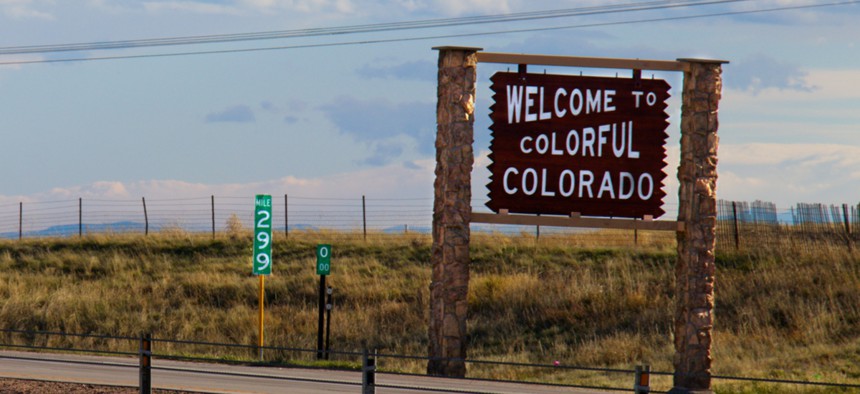Radioactive Sludge Disposal Heats Up Oil and Gas Politics in Colorado

Shutterstock
A “glitch” in state law has caused major heartburn for regulators.
Radioactive sludge produced as a byproduct of oil and gas drilling in Colorado has flowed through a hole in state law into solid waste landfills ill-equipped to handle it, regulators announced Wednesday.
There are only two landfills in the state approved to accept and bury the low-level radioactive waste, which is collected from oil filters, pipelines and storage tanks and termed “technologically enhanced naturally occurring radioactive material” or TENORM.
But regulators found that drillers have been depositing it at landfills indiscriminately and fear that radioactive waste may be leaching into soil.
A “glitch” in the law, The Denver Post reported, has made a tangle of the issue for regulators.
Martha Rudolph environment programs director at the Colorado Department of Public Health and Environment, told the Post that, on one hand, the agency is charged with regulating radioactive materials and required through a solid waste statute to prohibit disposal of radioactive waste at landfills not designated to handle it safely, but that, on the other hand, the department is prohibited by the radioactive materials statute from regulating radioactive material disposal.
She said it will fall to lawmakers to align the statutes and then the department could craft a new rule covering radioactive waste and landfills.
A new rule would, in theory, deposit radioactive sludge in facilities designed like the new Pawnee landfill being constructed outside Fort Collins, which will feature plastic liners, clay barriers and electronic leak-detectors meant to safely hold 15 million tons of the oil and gas industry waste.
The Colorado Oil and Gas Association, an industry trade group, issued a statement suggesting the matter was being overblown.
“While circumstances may be different in other states, there have been no indications this is an issue for oil and gas waste in Colorado,” wrote COGA President Dan Haley. “We have spoken with the state, with members of the waste industry, and others to begin exploring the realities of this matter.”
The back and forth is the latest chapter in a story that seems to feature dramatic narrative spikes every few months.
For years, the industry has been fighting a public relations battle in Colorado against activist residents and environmentalists over drilling operations increasingly set up in suburban neighborhoods across the Front Range north of Denver to the Wyoming border.
In April, an explosion made war-like rubble of a home in Firestone, a gas-patch suburb just east of Boulder, incinerating two men inside and alarming residents across the state. In May, inspectors confirmed residents’ worst fears when they reported that a severed flowline tied to a nearby abandoned well had filled the home’s basement with gas. The tragedy made national news and forced an historic round of well and line inspections voluntarily performed by drilling companies.
This week’s news that the industry is mishandling even a portion of the millions of tons of toxic liquid waste it produces will fuel perception that thinly staffed state regulatory offices are simply not up to task of properly overseeing the booming industry.
Indeed, the Post reported that, in announcing news of the improper waste disposal practices, state regulators also asked cities and counties to help them guard against any similar future violations, an apparent admission that there is just too much drilling activity being carried out over too much territory to fully monitor and that the viability of relying on industry “self regulation”—by tradition and necessity—has reached its limit.
The politics of oil and gas in Colorado over the last decade have become fraught and deeply partisan. The industry now donates its vast campaign sums lopsidedly to Republicans and its army of trade group staffers and legislative lobbyists work hand in glove with Republican elected officials to promote its interests. Many Democratic officials have become champions of increased oversight and, frustrated by gridlock at the divided legislature in Denver, have invested in efforts on the city and county level, where a growing number of constituents have come to view extraction in terms more practical than ideological.
They have proposed rules that aim to limit fumes, establish greater setback distances between drilling activity and buildings and effect greater mandatory transparency about the location and status of wells and flowlines.
The statute clarification regulators say they need lawmakers to pass to address radioactive industry waste is very likely to fuel familiar clashes. In the wake of the Firestone explosion Democrats introduced a bill to require drillers to make available well flowline mapping data to regulators and the public.
Industry opposed the bill and Republicans lawmakers lined up against it. The bill died swiftly in a Republican-controlled Senate committee.
John Tomasic is a journalist based in Seattle.
NEXT STORY: A Horrifying Statistic That Conveys the Sheer Scale of the Opioid Crisis





